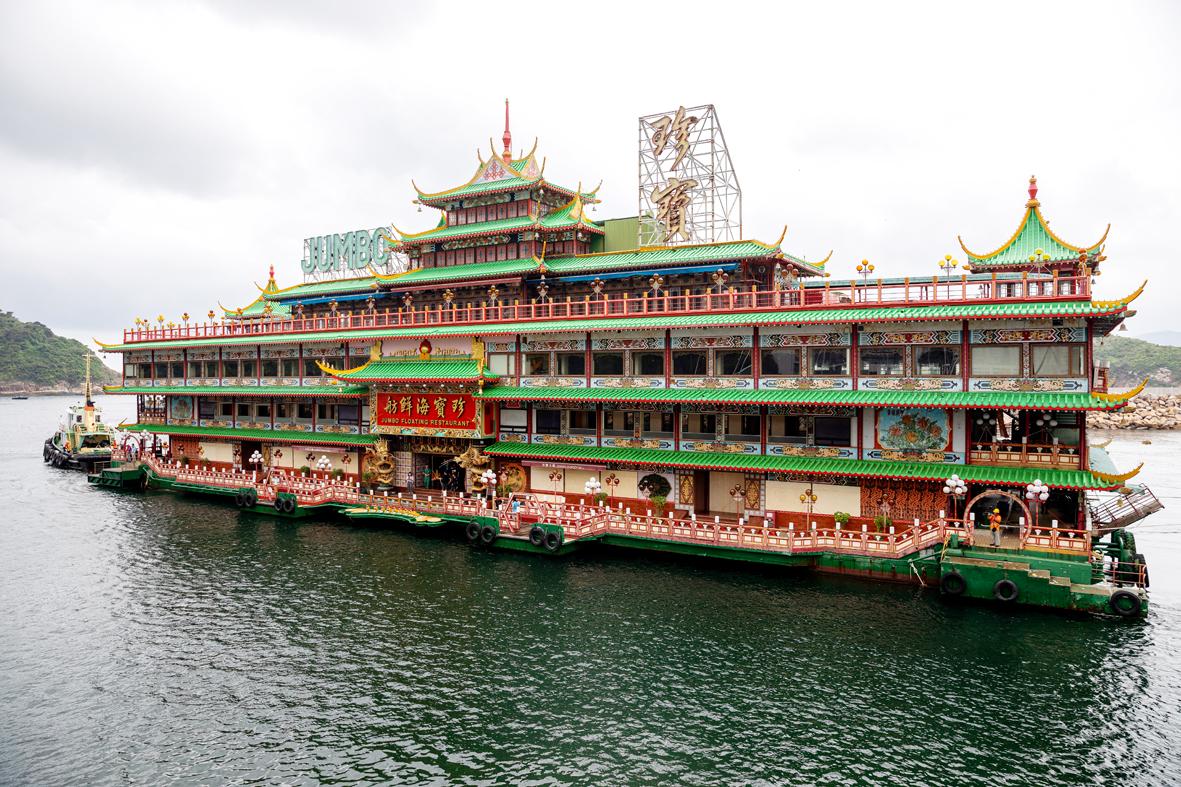Hong Kong’s Jumbo Floating Restaurant, a famed but aging tourist attraction that featured in multiple Cantonese and Hollywood films, was towed out of the city Tuesday after years of revitalization efforts went nowhere.
The buoyant behemoth, which at 76 meters long could house 2,300 diners, set out shortly before noon from the southern Hong Kong Island typhoon shelter where it has sat for nearly half a century. Designed like a Chinese imperial palace and once considered a must-see landmark, the restaurant drew visitors from Queen Elizabeth II to Tom Cruise, and featured in several films — including Steven Soderbergh’s Contagion, about a deadly global pandemic. The lavish restaurant’s operators cited the COVID-19 pandemic as the reason for finally closing its doors in March 2020, after around a decade of financial woes. Restaurant owner Melco International Development announced last month that ahead of its license expiration this month, Jumbo would leave Hong Kong and await a new operator at an undisclosed location.
Under overcast skies, a scattered group of onlookers gathered on the Aberdeen waterfront to see it be dragged away. Watching the restaurant’s ponderous progress across the shelter waters was Mr Wong, a 60-year-old man who said he had come specially to see its departure.

Photo: EPA-EFE
“The exterior was for many years a symbol of Hong Kong,” he said, adding he had eaten there once 20 years ago. “I believe it will come back and I look forward to it.”
Opened in 1976 by the late casino tycoon Stanley Ho (何鴻燊), the Jumbo Floating Restaurant embodied the height of luxury, reportedly costing over HK$30 million (US$3.8 million) to build. It featured a “dragon throne” in the style of the Ming dynasty as well as an opulent mural, according to the South China Morning Post.
The restaurant’s berth in Aberdeen harbor was traditionally a hotspot for seafood eateries — and fierce competition for customers only cooled when Jumbo’s operators acquired its biggest competitor, Tai Pak Floating Restaurant, in the 1980s.
The restaurant was kept afloat by Hong Kong’s booming tourism industry but its popularity had dimmed in recent years even before the coronavirus hit.
Restaurant operator Melco said last month the business had not been profitable since 2013 and cumulative losses had exceeded HK$100 million (US$12.7 million).
It was still costing millions in maintenance fees every year and around a dozen businesses and organizations had declined an invitation to take it over at no charge, Melco added. In her 2020 policy address, Hong Kong leader Carrie Lam (林鄭月娥) announced plans to turn the restaurant over to local theme park Ocean Park for revitalization, but the project fell through after the park said it could not find a suitable operator.
The ailing restaurant’s fate was sealed just days before Lam is set to leave office. In a sign of its dilapidation, on June 1, Jumbo’s kitchen boat listed into the water after a suspected hull breach, tilting almost 90 degrees. The derelict kitchen boat will be left behind, according to local media.

April 14 to April 20 In March 1947, Sising Katadrepan urged the government to drop the “high mountain people” (高山族) designation for Indigenous Taiwanese and refer to them as “Taiwan people” (台灣族). He considered the term derogatory, arguing that it made them sound like animals. The Taiwan Provincial Government agreed to stop using the term, stating that Indigenous Taiwanese suffered all sorts of discrimination and oppression under the Japanese and were forced to live in the mountains as outsiders to society. Now, under the new regime, they would be seen as equals, thus they should be henceforth

Last week, the the National Immigration Agency (NIA) told the legislature that more than 10,000 naturalized Taiwanese citizens from the People’s Republic of China (PRC) risked having their citizenship revoked if they failed to provide proof that they had renounced their Chinese household registration within the next three months. Renunciation is required under the Act Governing Relations Between the People of the Taiwan Area and the Mainland Area (臺灣地區與大陸地區人民關係條例), as amended in 2004, though it was only a legal requirement after 2000. Prior to that, it had been only an administrative requirement since the Nationality Act (國籍法) was established in

With over 80 works on display, this is Louise Bourgeois’ first solo show in Taiwan. Visitors are invited to traverse her world of love and hate, vengeance and acceptance, trauma and reconciliation. Dominating the entrance, the nine-foot-tall Crouching Spider (2003) greets visitors. The creature looms behind the glass facade, symbolic protector and gatekeeper to the intimate journey ahead. Bourgeois, best known for her giant spider sculptures, is one of the most influential artist of the twentieth century. Blending vulnerability and defiance through themes of sexuality, trauma and identity, her work reshaped the landscape of contemporary art with fearless honesty. “People are influenced by

The remains of this Japanese-era trail designed to protect the camphor industry make for a scenic day-hike, a fascinating overnight hike or a challenging multi-day adventure Maolin District (茂林) in Kaohsiung is well known for beautiful roadside scenery, waterfalls, the annual butterfly migration and indigenous culture. A lesser known but worthwhile destination here lies along the very top of the valley: the Liugui Security Path (六龜警備道). This relic of the Japanese era once isolated the Maolin valley from the outside world but now serves to draw tourists in. The path originally ran for about 50km, but not all of this trail is still easily walkable. The nicest section for a simple day hike is the heavily trafficked southern section above Maolin and Wanshan (萬山) villages. Remains of